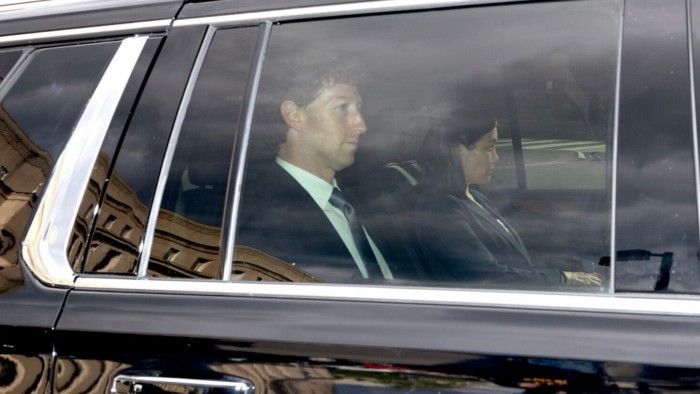
A important a part of Mark Zuckerberg’s defence in essentially the most critical antitrust problem in Meta’s historical past this week had little to do with the know-how large and far to do with TikTok.
In testimony throughout three days, the billionaire tech founder repeatedly informed a US federal court docket in Washington that the video platform owned by Chinese language dad or mum ByteDance had grown to develop into an incredible competitor.
The plaudits of his rival had a aim: quashing US Federal Commerce Fee allegations that Meta retained an unlawful monopoly, prices that, if confirmed, might doubtlessly have extra far-reaching penalties for Zuckerberg’s enterprise than any industrial risk it faces.
Lose the case, and Meta could possibly be pressured to interrupt up its $1.5tn group and spin off its Instagram and WhatsApp apps — an end result Zuckerberg has beforehand vowed to “go to the mat and battle”. Win, and it’ll have scored a decisive victory over a regulator that has lengthy had Large Tech in its sights, extra just lately suing retail large Amazon.
The trial comes after Zuckerberg failed to barter away the proceedings within the first place. In response to an individual conversant in the matter, the FTC had demanded $30bn as a possible settlement; Meta lowballed at $450mn then raised its proposal to $1bn after the regulator had set a flooring of $18bn. The events then determined to maneuver to court docket.

On the coronary heart of the FTC swimsuit is an allegation that Meta employed a “systematic technique” to remove rivals, together with by buying rivals Instagram and WhatsApp in 2012 and 2014 for $1bn and $19bn respectively.
FTC attorneys this week offered proof of Zuckerberg seeing these nascent purposes as a risk, together with a number of uncomfortable emails. Zuckerberg in 2012 agreed to recommendations that the Instagram deal may assist “neutralise a competitor” and in addition stated he wished Meta to “use M&A to construct a aggressive moat round us on cell and adverts”.
However such techniques would solely doubtlessly be deemed unlawful if the FTC can first show that Meta retains a monopoly, an argument some antitrust specialists say might be more durable to stack up. It’s a level Zuckerberg and former Meta chief working officer Sheryl Sandberg have targeted on of their testimonies, stressing TikTok’s explosive progress to serve greater than 1bn customers globally.
“What they stated and thought prior to now just isn’t an important look nevertheless it doesn’t have a lot probative worth — if any — for whether or not Meta maintains a monopoly now,” stated Paul Swanson, head of the antitrust and competitors follow at Holland & Hart.
“Zuckerberg and Sandberg did a very good job explaining why that may be a present actuality — [that] TikTok and Meta do have attrition from one another and are substitutes for one another in most customers’ minds.”
In antitrust challenges, the FTC should additionally show there was shopper hurt, which usually can be a monopolist driving up costs. With Meta providing its companies without cost, the company is as an alternative arguing that buyers suffered a degraded person expertise as a result of platform’s dominance — feeds crammed with adverts and poor privateness protections.
The important thing problem for the FTC might be convincing James Boasberg, the presiding choose, that Meta has dominated — partly by way of acquisitions — a “private social-networking” market targeted on friends-and-family connections, which doesn’t embody TikTok or Google’s YouTube.

An individual near the sooner settlement negotiations, which have been first reported by the Wall Avenue Journal, stated that Meta’s lowball supply confirmed how weak it thought of the FTC’s case to be. The FTC declined to remark.
“We haven’t been shy about explaining why it doesn’t make sense for the FTC to convey a case to trial that requires it to show one thing each 17-year-old in America is aware of is absurd — that Instagram doesn’t compete with TikTok. We’re ready to win at trial,” Meta spokesperson Dani Lever stated in a press release.
However some specialists argue that Boasberg, who has uttered few phrases all week, could also be receptive to the FTC’s arguments.
“The court docket is clearly open to the chance that there’s a private social networking market,” stated Kenneth Dintzer, accomplice within the antitrust and competitors group at Crowell & Moring. He referenced a 2024 submitting during which Boasberg stated the FTC had “met its burden to indicate that different purposes usually are not cheap substitutes” for friends-and-family sharing.
Zuckerberg rejected this notion in court docket, pointing to the group speeding to develop Reels — short-form movies — in response to TikTok’s meteoric rise. TikTok’s providing had “in all probability [been] the best aggressive risk towards Instagram and Fb in the previous couple of years”, Zuckerberg stated.
The Meta boss additionally argued WhatsApp and Instagram had been acquired to speed up their progress, pointing to the dramatic soar in customers following the offers.
The FTC countered with a 2013 electronic mail, during which Zuckerberg argued forward of the WhatsApp deal that “the most important aggressive vector for us is for some firm to construct out a messaging app for speaking with small teams of individuals, after which rework that right into a broader social community”.
After providing to show Sandberg the board sport The Settlers of Catan, Zuckerberg stated in a 2012 electronic mail: “[Facebook] Messenger isn’t beating WhatsApp, Instagram was rising a lot sooner than us that we had to purchase them for $1 billion . . . That’s not precisely killing it.”
“The confounding a part of Mark’s testimony is that he’s attempting to contradict statements in the present day that he made a decade in the past as these acquisitions have been being contemplated in actual time,” stated Lee Hepner, senior authorized counsel for the anti-monopoly non-profit American Financial Liberties Challenge.
Maybe essentially the most hanging proof got here within the type of a Zuckerberg electronic mail in 2018, the place he thought of spinning off Instagram — citing precisely the sort of risk from antitrust enforcement he faces in the present day.
As “calls to interrupt up the large tech corporations develop”, he wrote, “there’s a non-trivial likelihood that we are going to be pressured to spin out Instagram and maybe WhatsApp within the subsequent 5 to 10 years”.





